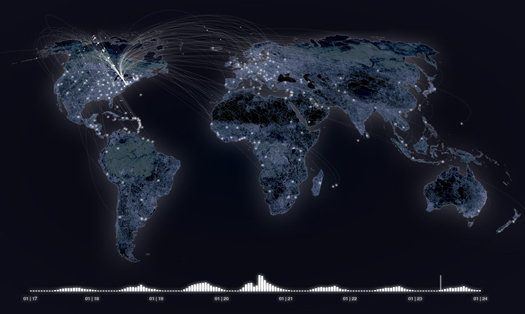Every time we make a call on our cell phone, send a text or download data, our mobile carrier knows who we were talking to and for how long, as well as our location at the time of the connection, accurate to within a mile. The carriers are just trying to figure out how to use this potential gold mine of immense user data for academic and commercial benefits.
These data reports, or call detail records (CDRs) have been kept for years, logging each connection with the specific ID of the cell tower that carried it. But only now are computer scientists developing algorithms powerful enough to analyze the data in meaningful and efficient ways.
MIT’s Tech Review spoke to Ramón Cáceres, a researcher at AT&T, on how his company is putting these newly acquired analytical powers to use. So far, it’s mostly academic and civic research. Studying travel habits of AT&T subscribers in New York and Los Angeles, for instance, Cáceres and his team found that the average Manhattanite travels 2.5 miles on average per day, while AT&T-using Angelenos log five miles. Another study, conducted by researchers at MIT, traced location data for mobile users attending major public events like a Red Sox game, analyzing how and when they travel to and from the stadium. Data such as these is proving incredibly valuable to city planners, who previously had to rely on limited surveys which are far less accurate.
But as you would imagine, the data is also tremendously useful (and valuable) commercially. Hyper-accurate location tracking could enable more accurate billboard advertising pricing, for instance. Every major network operator is now trying to decide how to use their golden pile of data for more revenue.
And of course, there are privacy concerns. Large analyses of CDRs are usually done anonymously. But one could very easily twist the numbers to, say, discern the home address of any subscriber by analyzing which cell towers their phones connect to most often in the overnight hours.
Massive-scale mobile data analyses such as these are uncharted territory, and while the potentials for both revenue and insight is high, it remains to be seen how the privacy implications will shake out.
Source: Popular Science.




Pingback: Brakes auto repair » Some Easy Way Of Automotive Fault Diagnosis
Pingback: How Your Credit History and Credit Score Impacts Your Life | Credit and Loan
Pingback: Coming to a Website Near You: .XXX | TechNexus.info
That’s right, that’s why carriers, mobile giant, and OS companies are entering location based field.